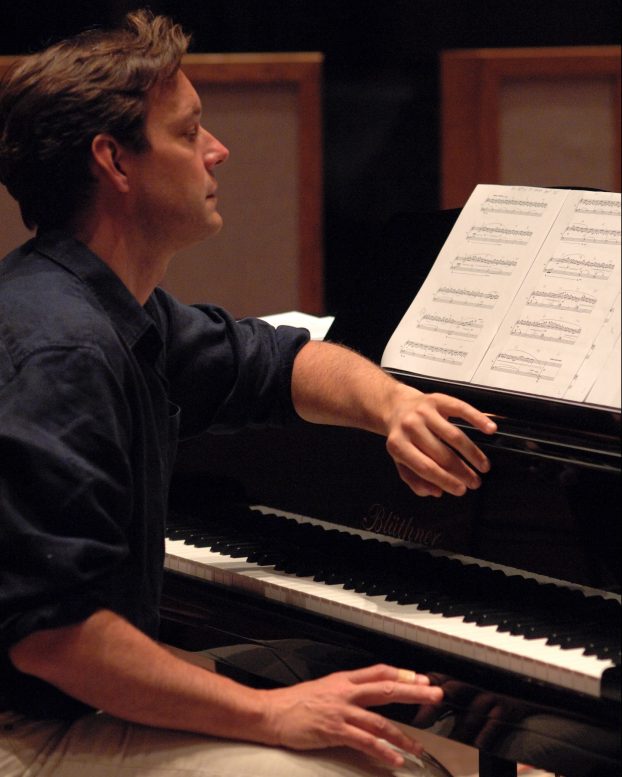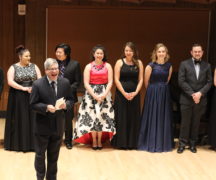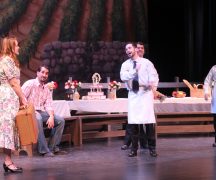By DAVID DUPONT
BG Independent News
When composer Jake Heggie comes to campus next week, he has a charge for music students – bring back the arts to schools.
“This is a critical moment,” he said. “Arts can save the world.” They build empathy and understanding, and without that human beings’ more destructive tendencies take hold.
Heggie, composer of the operas “Dead Man Walking,” “Moby-Dick,” “It’s a Wonderful Life,” and others, will visit Bowling Green State University Sunday, Oct. 22 through Tuesday, Oct. 24 as guest resident for the Edwin H. Simmons Creative Minds Series. He will give a free public lecture on Sunday at 8 p.m. in the Donnell Theatre in the Wolfe Center for the Arts. He will also give talks about his work, present workshops, and offer master classes Monday and Tuesday. Visit for www.bgsu.edu/CreativeMinds the schedule. All events are free. Heggie knows well the power of music to give solace and bring people together.
Growing up in Bexley outside of Columbus, he started to study classical piano, and around the house he heard the big band music his father, an avocational saxophonist, loved.
His father had dreamed of becoming a musician, but the son of Hungarian immigrants, he went into medicine and became a doctor. He suffered from depression and committed suicide when Heggie was 10.
Music helped Heggie deal with the emotional “shrapnel” of his father’s death. “I found solace in piano and musical theater. That’s where I found strength.”
He started about this time to write songs with his idols in mind, Barbra Streisand, Carly Simon, Peggy Lee, and the other musical storytellers whom he loved. He did not, he said, in a recent telephone interview, have any exposure to opera.
“I’ve always been drawn to singer telling stories,” he said. “It wasn’t a goal of mine to write opera. First and foremost I’m a theater composer. That’s what interests me, theater.”
He first heard the operatic voice when he was living in Paris at 18. He was amazed at the power. “That comes from a human body?”
His emergence as an opera composer has its own touch of musical theater magic. Rather than a dancer plucked from the chorus line to find stardom, Heggie was working in public relations for the San Francisco Opera when he was offered the chance to compose his first opera, “Dead Man Walking” a collaboration with Terrence McNally. That opera launched his career.
He had started writing about music after he developed focal dystonia in his right hand. That stalled his career as a pianist.
But his work at the San Francisco Opera gave him, he said, a thorough grounding in all aspects of the world of opera from the stars on stage to the mechanics behind the scenes. “That was enormously helpful.”
He was in San Francisco when the company premiered Conrad Sousa’s “The Dangerous Liaisons” in 1994 which starred, among others, Frederica Von Stade, to whom he showed some of his songs. She loved them, and she performed them accompanied by Heggie.
He had to retrain himself as a pianist. He can now play anything except pieces he played before he developed focal dystonia. If he plays those pieces, muscle memory kicks in and he reverts to playing as he did before and his hand cramps up. This is not a problem because he plays mostly new music and the song repertoire, which he hadn’t performed much before.
In time, he changed from writing about the San Francisco Opera to writing for it as a resident composer.
Heggie believes strongly in the importance of live performance. People gather together and set aside their differences to experience something that they never would otherwise. And afterward, they are better human beings for it, he said. He finds this “miraculous.”
Opera is about finding “who we are, and who we are together, and we fit with each other,” he said. It is about exploring emotion with music filling in between the words.
Though many of the major opera houses are struggling, Heggie is optimistic about the genre’s survival. “The arts are always in crisis,” Heggie said. That’s what keeps them developing and changing.
Opera should not be restricted to any particular venue. They can be in intimate as well as palatial settings.
“The one constant is the story and the singers to tell the story and a place for people to gather to hear the stories.”
With all the distractions of digital media, the challenge of getting people to leave the comfort of their homes and cell phones is difficult. People work hard and are juggling jobs and family obligations and more.
What will bring people out is the sense that if they don’t attend the performance they will have missed it forever.
“It does force us to be creative,” Heggie said.





